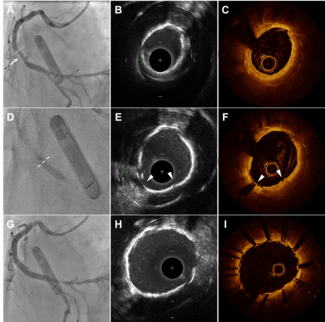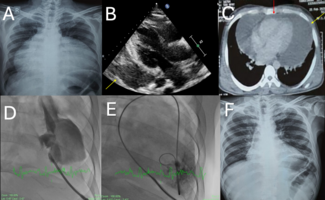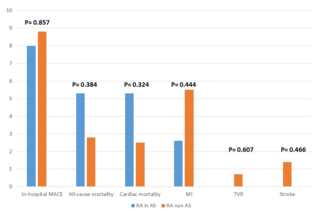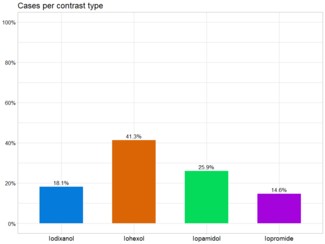December 2020 Table of Contents
Transcatheter Aortic Valve Replacement
Influence of Valve Type and Antiplatelet Regimen on Platelet Reactivity After TAVI: Subanalysis of the REAC-TAVI Trial
Blanca Trejo-Velasco, MD; Ignacio Cruz-González, MD, PhD; Antonio Tello-Montoliu, MD, PhD; Jose Antonio Baz-Alonso, MD; Pablo Juan Salvadores, Pharma, MPH; Raul Moreno, MD, PhD; Rafael Romaguera, MD, PhD; Eduardo Molina-Navarro, MD, PhD; Emilio Paredes-Galán, MD; Antonio De-Miguel-Castro, MD; Guillermo Bastos-Fernandez, MD; Alberto Ortiz-Saez, MD; Saleta Fernández-Barbeira, MD; Andres Iñiguez-Romo, MD, PhD; Victor Alfonso Jimenez-Diaz, MD, MPH
Ticagrelor has proven more effective than clopidogrel at attaining a maintained suppression of high platelet reactivity in aortic stenosis patients undergoing transcatheter aortic valve implantation (TAVI). This study aims to assess the influence of implanted valve type on the degree of platelet reactivity after TAVI.
J INVASIVE CARDIOL 2020;32(12):446-452. Epub 2020 August 10.
Original Contribution
Impact of Sex on Outcomes Among Patients With Cardiac Allograft Vasculopathy Who Undergo Percutaneous Coronary Intervention
Michael S. Lee, MD; Subeer K. Wadia, MD; Richard Shlofmitz, MD
Orthotopic heart transplantation is a reasonable treatment strategy for patients with end-stage heart failure. Percutaneous coronary intervention (PCI) can be performed to treat cardiac allograft vasculopathy (CAV). We sought to examine sex-based differences and outcomes in patients undergoing PCI for CAV by performing a single-center, retrospective study of consecutive patients undergoing PCI for CAV from July 1993 to July 2017.
J INVASIVE CARDIOL 2020(32):12:453-458. Epub 2020 November 22.
Original Contribution
Feasibility and Safety of Performing Complex Coronary Interventions by Distal Radial Artery Using the Railway Sheathless Vascular System
Giuseppe Colletti, MD; Jacques Auslender, MD; Antoine De Meester, MD; Adel Aminian, MD; Peter Kayaert, MD; Claudiu Ungureanu, MD
The aim of this clinical study is to assess the feasibility and safety of the 7 Fr Railway sheathless access system (Cordis Corporation) for complex PCI using distal radial artery access.
J INVASIVE CARDIOL 2020;32(12):459-462. Epub 2020 September 22.
Transcatheter Aortic Valve Replacement
Comparative Intermediate-Term Outcomes of Subclavian and Transcaval Access for Transcatheter Aortic Valve Replacement
Ashleigh Long, MD, PhD and Paul Mahoney, MD
Multiple alternative access routes have been employed for patients with contraindications to standard transfemoral transcatheter aortic valve replacement (TAVR); however, the optimal route for alternative access approach is not established. In order to better understand possible differences in alternative access routes, we compared the procedural efficacy and outcomes at 30 days and 1 year in patients who underwent TAVR via subclavian or transcaval access route at a single, tertiary-care center.
J INVASIVE CARDIOL 2020;32(12):463-469. Epub 2020 September 10.
Original Contribution
Caval Valve Implantation for Tricuspid Regurgitation: Insights From the United States Caval Valve Registry
Brian P. O’Neill, MD; Sara Negrotto, MD; Daohai Yu, PhD; Vladimir Lakhter, DO; Jeremiah Depta, MD; James M. McCabe, MD; Sandeep Dube, MD; Mahadevan Vaikom, MD; Dee Dee Wang, MD; Pravin Patil, MD; Brian Lindman, MD; Ignacio Iglessis-Azuaje, MD; Joseph Fredi, MD; Xiaoning Lu, MS; William W. O’Neill, MD
We sought to describe the outcomes of patients who underwent caval valve implantation (CAVI) for treatment of severe tricuspid regurgitation in the United States. Previous studies on CAVI have used a variety of techniques and transcatheter valves. We present our findings from CAVI with inferior vena cava implant using only a single valve.
J INVASIVE CARDIOL 2020;32(12):470-475. Epub 2020 October 22.
Original Contribution
Randomized COmparison of Isolated Radial Artery ComPrEssioN Versus Radial and Ipsilateral Ulnar Artery Compression in Achieving Radial Artery Patency: The OPEN-Radial Trial
Gaurav Patel, MD; Sanjay Shah, MD, DM; Bhavin A. Patel, MBBS; Tejas M. Patel, MD, DM
Radial artery occlusion (RAO) occurs after transradial access, limiting future ipsilateral access. Pragmatic RAO-lowering strategies need to be developed. Patients undergoing transradial cardiac catheterization were randomized to receive postprocedural hemostasis with either a single-bladder radial compression band or a double-balloon band capable of simultaneous ipsilateral ulnar artery compression. The primary endpoint of the study was achievement of patent hemostasis, defined as radial artery patency at 15 minutes after onset of hemostatic compression.
J INVASIVE CARDIOL 2020;32(12):476-482. Epub 2020 September 22.
Original Contribution
A Randomized Controlled Trial of Prasugrel for Prevention of Early Saphenous Vein Graft Thrombosis
Barbara A. Danek, MD; Aris Karatasakis, MD; Kazeen Abdullah, MD; Rahel Iwnetu, MD; Pratik Kalsaria, MS; Kendrick Shunk, MD; Jeffrey Zimmet, MD; Mladen Vidovich, MD; Anthony A. Bavry, MD, MPH; Bavana V. Rangan, BDS, MPH; Michele Roesle, RN, BSN; Decebal Griza, MD; Kathleen Stanley, RN; Subhash Banerjee, MD; Houman Khalili, MD; Emmanouil S. Brilakis, MD, PhD; Shuaib M. Abdullah, MD
Use of aspirin after coronary artery bypass grafting (CABG) improves graft patency, but administration of other antiplatelet agents has yielded equivocal results. Our objective was to test whether administration of prasugrel after CABG reduces saphenous vein graft thrombosis. We performed a double-blind trial randomizing patients to prasugrel or placebo after CABG at 4 United States centers.
J INVASIVE CARDIOL 2020;32(12):E305-E312. Epub 2020 September 22.
Original Contribution
Mid-Term Clinical Outcomes Following Percutaneous Mitral Valve Edge-to-Edge Repair
Ozan M. Demir, MBBS*; Martina Maria Ruffo, MD*; Cosmo Godino, MD; Marco Ancona, MD; Francesco Ancona, MD; Stefano Stella, MD; Andrea R. Munafó, MD; Antonio Sisinni, MD; Eustachio Agricola, MD; Antonio Colombo, MD; Alaide Chieffo, MD; Matteo Montorfano, MD *Joint first authors
Approximately 50% of patients with severe mitral regurgitation referred for surgery have prohibitive surgical risk. MitraClip (Abbott Vascular) is an alternative therapy option in these patients. The aim of this study is to evaluate mid-term outcomes in patients who underwent MitraClip implantation.
J INVASIVE CARDIOL 2020;32(12):E313-E320. Epub 2020 October 10.
Original Contribution
Resource Utilization During Elective Robotic-Assisted Percutaneous Coronary Intervention
Daniel Mangels, MD, MS; Alma Fregoso, BS; Lawrence Ang, MD; Ehtisham Mahmud, MD
Robotic PCI results in outcomes that are comparable to manual PCI in the treatment of obstructive coronary artery disease. The objective of this study is to evaluate the cost and resource utilization of robotic PCI compared with manual PCI.
J INVASIVE CARDIOL 2020;32(12):E321-E325. Epub 2020 August 22.
Original Contribution
Selective Coronary Artery Angiography in Hypoplastic Left Heart Syndrome
Sruti Rao, MD; Geetha Challapudi, MD; Neha Chellu; Salima Bhimani, MD; Lourdes Prieto, MD; Rukmini Komarlu, MD
Coronary artery disease in palliated hypoplastic left heart syndrome is uncommon. We sought to assess and describe coronary artery involvement in this complex patient population. Our research highlights both the need to assess distal coronary vasculature and to thoroughly evaluate hemodynamics and biventricular function with new-onset troponin leak or ventricular arrhythmias.
J INVASIVE CARDIOL 2020;32(12):E326-E330. Epub 2020 November 10.
Original Contribution
Hard Events AfteR Orsiro Sirolimus-Eluting Stent (HEROES) in STEMI: A Multicenter Registry
Vincenzo De Marzo, MD; Rosario Parisi, MD; Marco Caruso, MD; Domenico D’Amario, MD, PhD; Gianmarco Annibali, MD; Vincenzo Manganiello, MD; Rocco Vergallo, MD, PhD; Michael Donahue, MD; Pio Cialdella, MD; Alfonso Ielasi, MD; Leonardo Misuraca, MD; Luca Altamura, MD; Bernardo Cortese, MD; Claudio Larosa, MD; Marco Canepa, MD, PhD; Italo Porto, MD, PhD
Our objective was to evaluate the safety and efficacy of the Orsiro sirolimus-eluting stent (Biotronik) in patients with ST-segment elevation myocardial infarction undergoing primary PCI. Specific drug-eluting stent platforms might influence primary PCI success rate in the mid-to-long term. Orsiro, a hybrid sirolimus drug-eluting stent with thin struts and a biodegradable polymer, may potentially cause less stent malapposition, stent-induced inflammation, and mechanical damage, improving clinical outcomes.
J INVASIVE CARDIOL 2020;32(12):E331-E337. Epub 2020 November 22.
Peripheral Vascular Disease
Femoral Artery Chronic Total Occlusion Revascularization (FACTOR) Score and Algorithm: Feasibility and Validation in a Single-Center Study of Femoropopliteal Occlusions
Vincent Varghese, DO; Hafeez ul Hassan Virk, MD; Vladimir Lakhter, DO; Luai Tabaza, MD; Ebenezer Oni, MD; Rajeev Marreddy, DO; Richard Kovach, MD; Sean Janzer, MD; Jon C. George, MD
Superfical femoral artery chronic total occlusion represents one of the most challenging subsets of lower-extremity peripheral arterial disease. Depending on lesion characteristics, successful percutaneous crossing of the occluded segment may prove to be very difficult. Our objective was to develop and validate a hybrid algorithm to approach complex superficial femoral artery chronic total occlusions in a step-wise fashion.
J INVASIVE CARDIOL 2020;32(12):E338-E348. Epub 2020 August 22.
Original Contribution
The Safety and Feasibility of Transitioning From Transfemoral to Transradial Access Left Ventricular Endomyocardial Biopsy
Zaccharie Tyler, MBBS; Oliver P. Guttmann, MRCP(UK); Mehul Dhinoja, MRCP(UK); Rodnie Oro, BSc; Konstantinos Savvatis, MD, PhD; Saidi Mohiddin, FRCP(UK); Neha Sekhri, FRCP(UK); Luis Lopes, MD; Vimal Patel, MD(Res), MRCP(UK); Daniel A. Jones, MRCP(UK); Christos V. Bourantas, MD, PhD; Anthony Mathur, FRCP(UK), PhD; Perry M. Elliott, MD, FRCP(UK); Constantinos O’Mahony, MD(Res), FRCP(UK)
Left ventricular endomyocardial biopsy (LVEMB) is commonly performed via the transfemoral route. Radial access may help reduce vascular access complications, but there are few data on the safety and feasibility of transradial LVEMB. We describe the safety and feasibility of transitioning from transfemoral to transradial access LVEMB. Fifty procedures in 49 patients were included in this single-center study.
J INVASIVE CARDIOL 2020;32(12):E349-E354. Epub 2020 November 10.
Transcatheter Aortic Valve Replacement
Impact of Rapid Ventricular Pacing During Transcatheter Implantation of Self-Expanding Aortic Valve Prostheses in Patients at Highest Risk
Ulrich Fischer-Rasokat, MD, PhD; Matthias Renker, MD; Christoph Liebetrau, MD, PhD; Helge Möllmann, MD, PhD; Christian W. Hamm, MD, PhD; Won-Keun Kim, MD
Patients with low-flow, low-gradient (LFLG) aortic stenosis (AS) have the highest risk among all AS patients. We investigated the effects of rapid ventricular pacing in patients with LFLG-AS.
J INVASIVE CARDIOL 2020;32(12):E355-E361. Epub 2020 November 22.
Review
Pacemaker-Related Complications in Patients Undergoing Transcatheter Aortic Valve Implantation: A Single-Center Experience
Giuseppe Lanzillo, MD*; Antonio Mangieri, MD*; Matteo Pagnesi, MD; Claudio Montalto, MD; Ozan M. Demir, MD; Alessandra Laricchia, MD; Jonathan Curio, MD; Gabriele Paglino, MD; Francesco Giannini, MD; Antonio Colombo, MD; Matteo Montorfano, MD; Azeem Latib, MD *Joint first authors
We review the rate of complications secondary to permanent pacemaker implantation after TAVI.
J INVASIVE CARDIOL 2020;32(12):E362-E369.
Brief Communication
Balloon Fragment Technique Used to Close Distal Coronary Vessel Perforation
Grzegorz Sobieszek, MD and Bartosz Zieba, MD
We present a method of treating distal perforation that involves embolization of a perforated vessel with a cut part of a balloon catheter.
J INVASIVE CARDIOL 2020;32(12):E370-E372.
Clinical Images
Huge Cavity Spilling Coronary Perforation Management: When the Basic Works Well
Marcos Danillo P. Oliveira, MD; Ednelson Cunha Navarro, MD; Adriano Caixeta, MD, PhD
Type III cavity-spilling coronary artery perforation is an unusual complication. Conservative management is possible with prolonged balloon inflation without compromising the final PCI result.
J INVASIVE CARDIOL 2020;32(12):E373-E374.
Clinical Images
Invasive Hemodynamic Red Flags To Left Ventricular Assist Device Implantation
Faris G. Araj, MD; Alpesh A. Amin, MD; Sonia Garg, MD; E. Ashley Hardin, MD
Reliable identification of patients at high risk for right ventricular failure is very important. We identify 4 parameters as hemodynamic red flags to left ventricular assist device implantation.
J INVASIVE CARDIOL 2020;32(12):E375-E376.
Clinical Images
Guidezilla-Assisted Tracking of Guide Catheter for Tortuous and Angulated Subclavian-Brachiocephalic Artery During Transradial Intervention
Dan Niu, MD; Jincheng Guo, MD; Jiahui Song, MD
This case highlights the novel use of the Guidezilla catheter to facilitate guide catheter use during transradial intervention by overcoming a tortuous and angulated SB artery.
J INVASIVE CARDIOL 2020;32(12):E377.
Clinical Images
Balloon Compression Sign During Balloon Mitral Valvotomy: An Old Sign Revisited
Anunay Gupta, MBBS, MD, DM; Gaurav Kumar Arora, MBBS, MD; Dinkar Bhasin, MBBS, MD, DM; Preeti Gupta, MBBS, MD, DNB; Sandeep Bansal, MD, DM; Sourabh Agstam, MBBS, MD, DM
During inflation of the Inoue balloon during a balloon mitral valvotomy, indentation and compression of the Inoue balloon was seen. This is indirect evidence of severe subvalvular disease.
J INVASIVE CARDIOL 2020;32(12):E378.
Clinical Images
Percutaneous Management of Vascular Complications Following Trans-Subclavian Transcatheter Aortic Valve Replacement
Qassem Sanallah, MD; Nader Khader, MD; Moshe Y. Flugelman, MD; Ronen Jaffe, MD
We present 2 cases that demonstrate the potential for vascular complications following trans-subclavian TAVR and the role of percutaneous intervention in managing such situations.


















